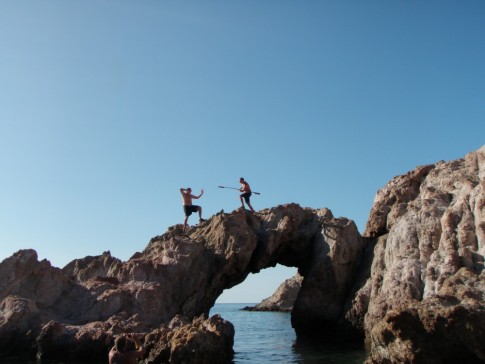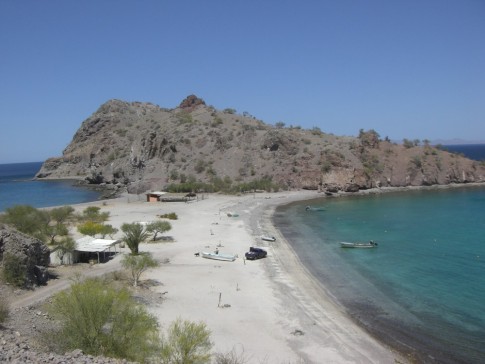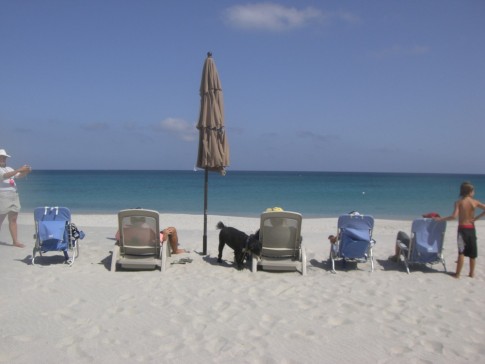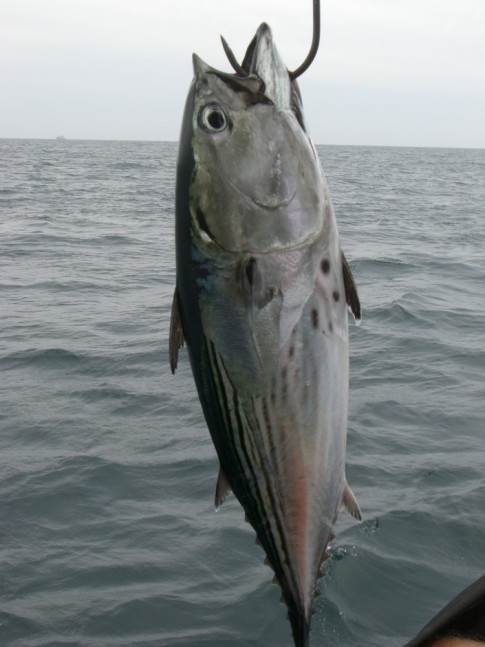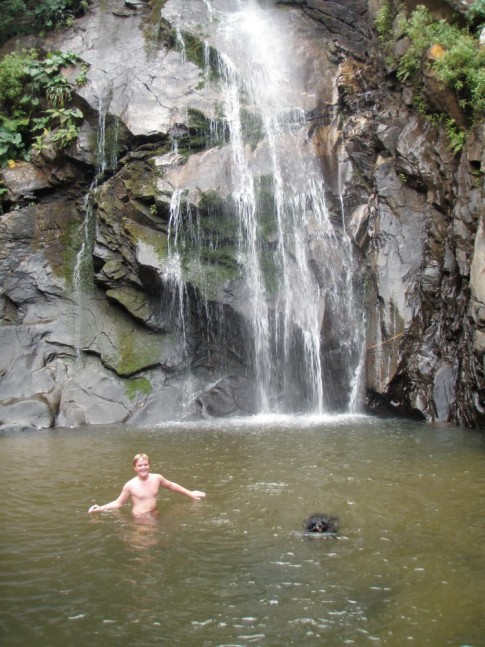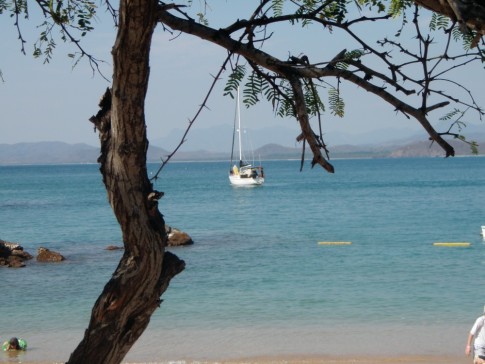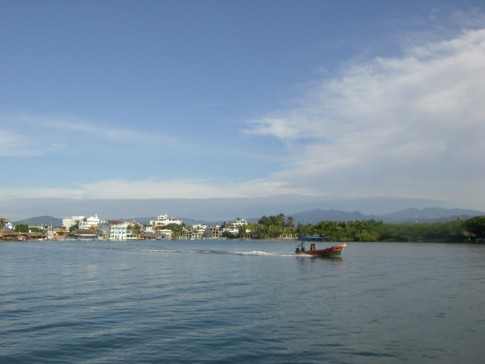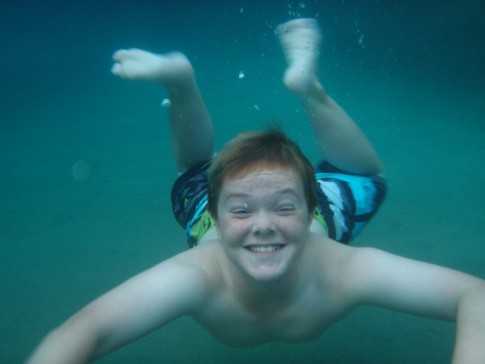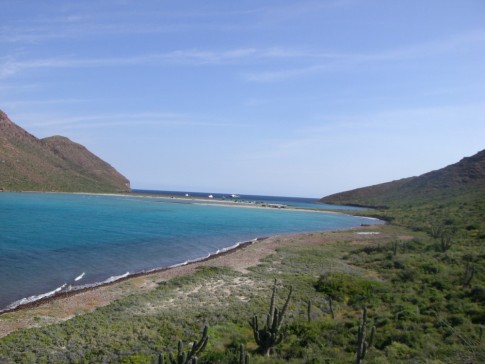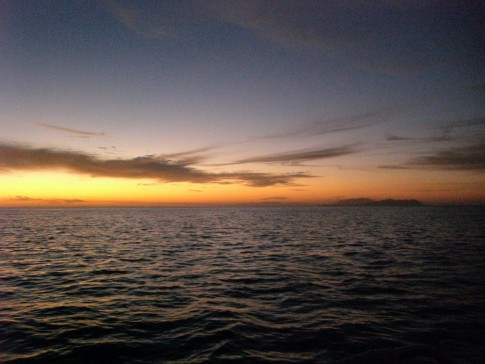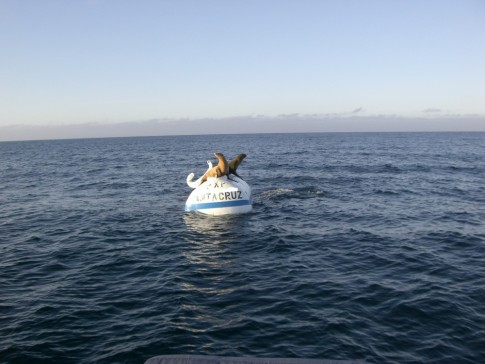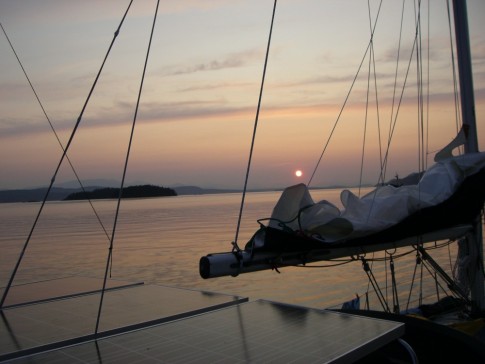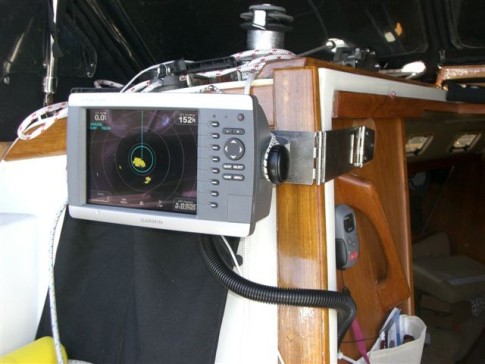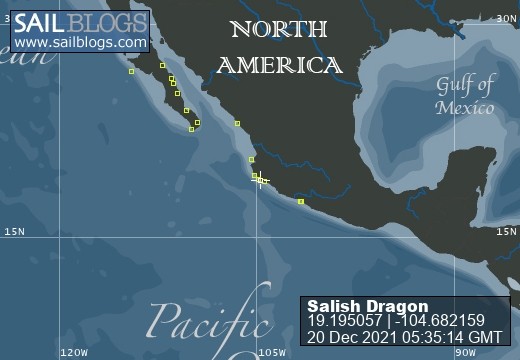Salish Dragon Tales
20 December 2021 | Mexico City
14 April 2020
27 March 2020
26 March 2020 | Port Coquitlam
24 March 2020 | Undisclosed Location, Port Coquitlam BC
04 March 2020 | Zihuatanejo
26 February 2020 | Zihuatanejo
11 February 2020 | Tenacatita
03 February 2020 | Mazzy
03 February 2020 | Mazatlan
01 February 2020 | Mazatlan
01 February 2020 | Mazzy
26 March 2019 | La Cruz de Huanacastle
19 December 2018 | La Cruz de Huanacaxtle
25 September 2018
12 September 2018 | Santa Cruz
19 August 2018 | Eureka, CA
12 August 2018 | Coos Bay
30 June 2018
08 July 2017
CDMXing
20 December 2021 | Mexico City
Steve Dolling
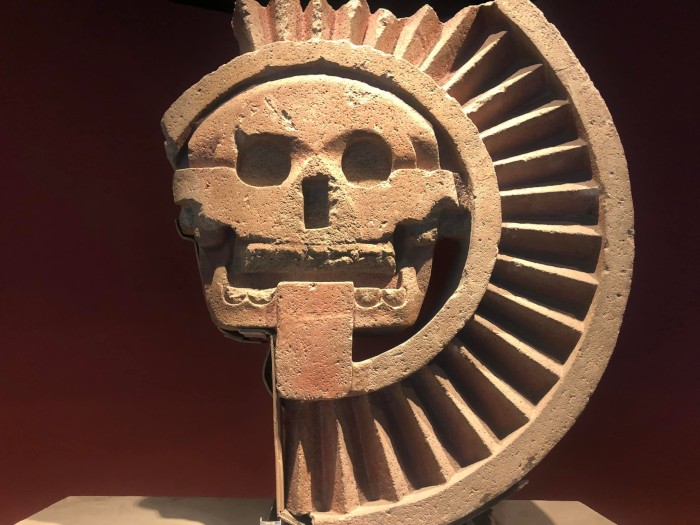
We've parked our butts in plastic beach chairs, feet in the sand, drinking margaritas on a good chunk of the Mexican coast: from Progresso to Tulum via all-inclusive resorts in the east and from Puerto Peñasco to Zihuantanejo via sailboat in the West. Cumulatively, we've lived in Mexico for about 2 years and have learned embarrassingly little of the vast country and her culture. It was time for a slightly deeper exploration, so we headed to Mexico City as our Christmas gift to each other.
Ciudad de México (CDMX) is an interesting city with a reputation. Somewhere in my mind was a distorted notion of a giant city in the middle of a volcanic bowl choked with pollution, unbearable traffic, and crime. You know, the kind of place where, as you are gasping for breath, someone will pull up on a motorcycle, reach into your taxi, grab your arm, and cut your hand off to steal your watch.
It is not like that.
For sure Mexico City has a history of violence. As I understand it, based on my informed Amigotours.com in-depth historical research, some badass dudes came here, tortured and killed a bunch of people, subjugated all the surrounding population and terraformed a little town on an island in Lake Texcoco. After a couple hundred years, it became the fifth largest city in the world: Tenochtitlán, center of the Aztec empire.
Then along came Hernán Cortez.
This good Christian from Spain rolled into Tenochtitlán and was appalled by the Mexica tendency to sacrifice children with double cowlicks on altars atop giant pyramids. He set about torturing and killing a bunch of people and subjugating the surrounding population to set things right in the eyes of the correct God.
80 or 90% of the people succumbed to steel, lead, and microbes. The city's beautiful pyramids. temples, administrative buildings, and palaces were all levelled to allow for the building of new temples, administrative buildings, and palaces. The lake was drained, and the city further terraformed until eventually, over a few hundred years, it grew to become once again the fifth largest city in the world: México, capital of the Estados Unidos Mexicanos.
The number of gods were reduced to one and most people here have ancestors from the old world and the new world though I am not really sure which world is which. It's a rich conflicted history about which Mexicans seem to be both intensely proud and deeply uneasy.
We stayed in the Hotel Zócalo Centro which is a totally cool modern hotel in an ancient shell built upon the foundation of emperor Moctezuma's palace and later the houses of Cortés. We're not sure but we think Moctezuma's granddaughter (Cortés' daughter) Leonor Cortés Moctezuma probably stayed in room 412 right next to us.
The Zócalo is the main square in the very heart of historical central Mexico. The name Zocalo comes from a plinth constructed as the foundation for a monument to Mexico's independence. They never got around to building the monument and the plinth eventually sunk into the earth, but the name stuck for the square. I like to think of it as the national metaphor for Mexican real estate development. Central squares in several Mexican cities are now called Zócalos.
We had breakfast every morning looking out over the Zócalo across to AMLO's house (Palacio National) and the big cathedral. It's a cool location. They shot the opening sequence for the James Bond film Spectre here in 2015 with helicopter action overlayed on a Day of the Dead parade. Mexico never had a Day of the Dead parade at the Zócalo, but they liked the film sequence so much they now have one here every year using costumes and props from the movie.
A walk through the Templo Mayor's destroyed ruins and the adjacent cathedral expose 700 years of history in a couple of blocks
CDMX is not like touristy coastal cities where most everyone seems to speak a little English. In CDMX, often the cab driver or server speaks less English than we speak Spanish, and Foster has rated our level of linguistic accomplishment as Toddler, or more precisely, Drunken Toddler. We often now find ourselves in trouble when we start a conversation and people assume we are fluent and respond in rapid-fire Spanish.
I used to say to people, "Los siento, no hablo español" which actually causes confusion when I do speak a little and claim I don't. My favourite new phrase is "Hablo español como un niño alcohólico." It is a ridiculous phrase which is universally understood and always triggers a warm smile. I used it often in CDMX.
The city itself definitely has a lot of traffic and a lot of people, but it is surprisingly clean and calm. There are no horns honking. Pedestrians weave in and out of traffic with a confident calmness. Nobody seems to obey the traffic lights, but cars and pedestrians all seem to follow the rule of "don't do stupid stuff" and it all kind of works with an interesting mutual respect that I haven't noticed in other cities around the world.
Covid is a serious thing in CDMX. Masks are worn everywhere, and temperatures are taken at the entrance to every business or public building. Hand sanitizer is dispensed by volunteers on the streets. There are no protests or complaints. A cab driver explained that everyone here has had a friend or relative who has been very sick or died and their idea of freedom is keeping the virus suppressed enough that they don't have to go back to the red-light restrictions and buying oxygen cylinders to care for their friends. We saw one incident where a tourist at the national museum of anthropology was asked 3 times to put his mask on and he would remove it as soon as the guard walked away. They ejected him from the museum, and he stormed out without his mask. I think there was a small cheer. Interesting.
I never really understood Frida. We went to the museum. I will never really understand Frida. I think it's a Mexican thing. Diego I get. Google "art deco atheist communist muralist", Diego Rivera will be the first hit. Interesting stuff. I have no concept really of what is right and left in Mexico. I'll have to advance beyond Drunken Toddler level to learn a little more.
And speaking of Diegos, our tour took us to the Basilica de Guadalupe where Juan Diego Cuauhtlatoatzin bumped into the virgin Mary on three occasions. The third interaction resulted in an early polaroid image developing right on his cloak so that the bishop would know he wasn't making up a story. The bishop ordered the building of the shrine that Mary was asking for. This is the third most visited sacred site in the world. The latest iteration features a moving walkway past the original cloak, and you can exit through a kind of walk-through holy water dispensary where the priest seems to hit about six people per shot. With 10 million visitors annually at 250mL per throw, if half opt for the holy water, they have to be slinging over 400,000 litres of holy water per year. I must confess the Diego story to me seemed to blend together with some of the Aztec and Mayan stories and I can't say one was more compelling than another, but the Pope made Diego a saint in 1990 so his story has legs.
Personally what was compelling for me was the old Basillica which is typical of old buildings in Mexico City as it has a noticeable lean to it as it sinks into the lakebed. The new one seems level for now. All over the city you can see old buildings with several degrees of tilt.
Interestingly, the Aztecs kept rebuilding their pyramids. Templo Mayor was on it's seventh iteration when Cortez had it destroyed. The guide mentioned something about a 52-year cycle where the next emperor would build a bigger and better pyramid on top of the old one to emphasize the majesty and growing greatness of the empire or something like that. It seems like a nice story, but I think that the Aztecs were just trying to keep their pyramids from disappearing into the lakebed. One emperor's pyramid was just preload for the next emperor.
Xochimilco is a cool place. Here they have canals that were typical of the whole valley before the Spanish drained it. We went for a ride on a pole propelled trajinera and enjoyed an excellent lunch prepared on a food boat which rafted up behind us. Mariachis boarded and played for us. It's a cheesy Mexican tourist experience, but one with hundreds of years of history and world heritage status. Even locals love it.
Overall Mexico City was amazing. Not at all the violent crowded polluted urban hell I've heard some describe it as, but instead a vibrant, clean, colourful city with broad boulevards lined with poinsettias. It's an impressive national capital that is unique. We never feared for our safety and walked around freely even at night. To be clear, there are whole neighborhoods that hotel concierge marked out of bounds with a highlighter. One neighbourhood features gondolas over top to allow safe passage for the rich folks who live up on the hill. It's dubbed a Pueblo Magico because if you go there, like magic, you disappear.
The food was great and the people were well, Mexican. That is they were warm, welcoming, hard-working people with a sense of humour and openness. Even the street vendors are super polite and everyone is respectful. We never saw anyone mistreated or harsh words exchanged.
I feel like I understand Mexico a little better. Advancing towards Sober Toddler.
Ciudad de México (CDMX) is an interesting city with a reputation. Somewhere in my mind was a distorted notion of a giant city in the middle of a volcanic bowl choked with pollution, unbearable traffic, and crime. You know, the kind of place where, as you are gasping for breath, someone will pull up on a motorcycle, reach into your taxi, grab your arm, and cut your hand off to steal your watch.
It is not like that.
For sure Mexico City has a history of violence. As I understand it, based on my informed Amigotours.com in-depth historical research, some badass dudes came here, tortured and killed a bunch of people, subjugated all the surrounding population and terraformed a little town on an island in Lake Texcoco. After a couple hundred years, it became the fifth largest city in the world: Tenochtitlán, center of the Aztec empire.
Then along came Hernán Cortez.
This good Christian from Spain rolled into Tenochtitlán and was appalled by the Mexica tendency to sacrifice children with double cowlicks on altars atop giant pyramids. He set about torturing and killing a bunch of people and subjugating the surrounding population to set things right in the eyes of the correct God.
80 or 90% of the people succumbed to steel, lead, and microbes. The city's beautiful pyramids. temples, administrative buildings, and palaces were all levelled to allow for the building of new temples, administrative buildings, and palaces. The lake was drained, and the city further terraformed until eventually, over a few hundred years, it grew to become once again the fifth largest city in the world: México, capital of the Estados Unidos Mexicanos.
The number of gods were reduced to one and most people here have ancestors from the old world and the new world though I am not really sure which world is which. It's a rich conflicted history about which Mexicans seem to be both intensely proud and deeply uneasy.
We stayed in the Hotel Zócalo Centro which is a totally cool modern hotel in an ancient shell built upon the foundation of emperor Moctezuma's palace and later the houses of Cortés. We're not sure but we think Moctezuma's granddaughter (Cortés' daughter) Leonor Cortés Moctezuma probably stayed in room 412 right next to us.
The Zócalo is the main square in the very heart of historical central Mexico. The name Zocalo comes from a plinth constructed as the foundation for a monument to Mexico's independence. They never got around to building the monument and the plinth eventually sunk into the earth, but the name stuck for the square. I like to think of it as the national metaphor for Mexican real estate development. Central squares in several Mexican cities are now called Zócalos.
We had breakfast every morning looking out over the Zócalo across to AMLO's house (Palacio National) and the big cathedral. It's a cool location. They shot the opening sequence for the James Bond film Spectre here in 2015 with helicopter action overlayed on a Day of the Dead parade. Mexico never had a Day of the Dead parade at the Zócalo, but they liked the film sequence so much they now have one here every year using costumes and props from the movie.
A walk through the Templo Mayor's destroyed ruins and the adjacent cathedral expose 700 years of history in a couple of blocks
CDMX is not like touristy coastal cities where most everyone seems to speak a little English. In CDMX, often the cab driver or server speaks less English than we speak Spanish, and Foster has rated our level of linguistic accomplishment as Toddler, or more precisely, Drunken Toddler. We often now find ourselves in trouble when we start a conversation and people assume we are fluent and respond in rapid-fire Spanish.
I used to say to people, "Los siento, no hablo español" which actually causes confusion when I do speak a little and claim I don't. My favourite new phrase is "Hablo español como un niño alcohólico." It is a ridiculous phrase which is universally understood and always triggers a warm smile. I used it often in CDMX.
The city itself definitely has a lot of traffic and a lot of people, but it is surprisingly clean and calm. There are no horns honking. Pedestrians weave in and out of traffic with a confident calmness. Nobody seems to obey the traffic lights, but cars and pedestrians all seem to follow the rule of "don't do stupid stuff" and it all kind of works with an interesting mutual respect that I haven't noticed in other cities around the world.
Covid is a serious thing in CDMX. Masks are worn everywhere, and temperatures are taken at the entrance to every business or public building. Hand sanitizer is dispensed by volunteers on the streets. There are no protests or complaints. A cab driver explained that everyone here has had a friend or relative who has been very sick or died and their idea of freedom is keeping the virus suppressed enough that they don't have to go back to the red-light restrictions and buying oxygen cylinders to care for their friends. We saw one incident where a tourist at the national museum of anthropology was asked 3 times to put his mask on and he would remove it as soon as the guard walked away. They ejected him from the museum, and he stormed out without his mask. I think there was a small cheer. Interesting.
I never really understood Frida. We went to the museum. I will never really understand Frida. I think it's a Mexican thing. Diego I get. Google "art deco atheist communist muralist", Diego Rivera will be the first hit. Interesting stuff. I have no concept really of what is right and left in Mexico. I'll have to advance beyond Drunken Toddler level to learn a little more.
And speaking of Diegos, our tour took us to the Basilica de Guadalupe where Juan Diego Cuauhtlatoatzin bumped into the virgin Mary on three occasions. The third interaction resulted in an early polaroid image developing right on his cloak so that the bishop would know he wasn't making up a story. The bishop ordered the building of the shrine that Mary was asking for. This is the third most visited sacred site in the world. The latest iteration features a moving walkway past the original cloak, and you can exit through a kind of walk-through holy water dispensary where the priest seems to hit about six people per shot. With 10 million visitors annually at 250mL per throw, if half opt for the holy water, they have to be slinging over 400,000 litres of holy water per year. I must confess the Diego story to me seemed to blend together with some of the Aztec and Mayan stories and I can't say one was more compelling than another, but the Pope made Diego a saint in 1990 so his story has legs.
Personally what was compelling for me was the old Basillica which is typical of old buildings in Mexico City as it has a noticeable lean to it as it sinks into the lakebed. The new one seems level for now. All over the city you can see old buildings with several degrees of tilt.
Interestingly, the Aztecs kept rebuilding their pyramids. Templo Mayor was on it's seventh iteration when Cortez had it destroyed. The guide mentioned something about a 52-year cycle where the next emperor would build a bigger and better pyramid on top of the old one to emphasize the majesty and growing greatness of the empire or something like that. It seems like a nice story, but I think that the Aztecs were just trying to keep their pyramids from disappearing into the lakebed. One emperor's pyramid was just preload for the next emperor.
Xochimilco is a cool place. Here they have canals that were typical of the whole valley before the Spanish drained it. We went for a ride on a pole propelled trajinera and enjoyed an excellent lunch prepared on a food boat which rafted up behind us. Mariachis boarded and played for us. It's a cheesy Mexican tourist experience, but one with hundreds of years of history and world heritage status. Even locals love it.
Overall Mexico City was amazing. Not at all the violent crowded polluted urban hell I've heard some describe it as, but instead a vibrant, clean, colourful city with broad boulevards lined with poinsettias. It's an impressive national capital that is unique. We never feared for our safety and walked around freely even at night. To be clear, there are whole neighborhoods that hotel concierge marked out of bounds with a highlighter. One neighbourhood features gondolas over top to allow safe passage for the rich folks who live up on the hill. It's dubbed a Pueblo Magico because if you go there, like magic, you disappear.
The food was great and the people were well, Mexican. That is they were warm, welcoming, hard-working people with a sense of humour and openness. Even the street vendors are super polite and everyone is respectful. We never saw anyone mistreated or harsh words exchanged.
I feel like I understand Mexico a little better. Advancing towards Sober Toddler.
Freedom in Various Forms
14 April 2020
Steve Dolling
I have been a little concerned that either our government officials don't have a plan, or if they do have a plan, they aren't sharing with us what it will be. I watched an interview with Malcolm Gladwell on life after Covid and was disappointed that even the forward thinkers seem reluctant to share a vision of the future. So I'll take the liberty of laying out what is going to happen in the US and Canada in the next 6 weeks. By May 31st:
There will emerge a new class of people who shall have special privileges. They will wear green arm bands (or the digital equivalent). They will number about 25 million. Serological tests will demonstrate high levels of Covid19 antibodies in their blood. They will walk the streets without masks and demonstrate what freedom truly is. New York will have the greatest population. These people will be the Truly Free.
The rest of the population will watch and listen as their leaders babble on about testing and tracing to get the economy back on track. Testing and tracing be the new weapons in the war on corona virus. We'll hear less about PPE and ventilators as defensive weapons and more about testing and tracing as the new offensive weapons.
Mandatory testing and tracing will go against the notion of personal freedom and what some believe wars have been fought for. Most objectionable will be the little mentioned mandatory quarantine for those whose tests indicate pending True Freedom. The populace will grip their guns tightly. The administrations will be quietly envious of China and how flat an authoritarian curve can be.
Then a new app will appear. It will be called the Freedom App. The Apple version will be called iFreedom. It will promise a really cool graphical interface which ties into well-spaced restaurant seats and live maps of the safe areas to travel. Physical distance alarms will quietly vibrate in pockets and purses everywhere. The terms of use will be 14 pages of small print. Everyone will click "I AGREE" without reading. It will automate tracing and logging of people's health status and immune response. Version 8 will incorporate a vaccine registry. The new class of people, the Electronically Free will head back out into the world.
The Electronically Free will enjoy life much like the Truly Free except with residual fear.
The old and the compromised will remain inside waiting for the vaccine. These people will remain the UnFree.
Widespread clinical trials of different vaccines will be announced. 2/3 of anti-vaxers will begin to believe in science by May 31st.
Version 9 will have a vaccine prioritization status live tracker, but it won't be released until September.
So there you go. That's how it will be in the next six weeks. You're welcome.
Next up, I'll let you know what is going to happen to your retirement portfolio, your Covid benefit eligibility, and what it will be like to fly on airplane again.
There will emerge a new class of people who shall have special privileges. They will wear green arm bands (or the digital equivalent). They will number about 25 million. Serological tests will demonstrate high levels of Covid19 antibodies in their blood. They will walk the streets without masks and demonstrate what freedom truly is. New York will have the greatest population. These people will be the Truly Free.
The rest of the population will watch and listen as their leaders babble on about testing and tracing to get the economy back on track. Testing and tracing be the new weapons in the war on corona virus. We'll hear less about PPE and ventilators as defensive weapons and more about testing and tracing as the new offensive weapons.
Mandatory testing and tracing will go against the notion of personal freedom and what some believe wars have been fought for. Most objectionable will be the little mentioned mandatory quarantine for those whose tests indicate pending True Freedom. The populace will grip their guns tightly. The administrations will be quietly envious of China and how flat an authoritarian curve can be.
Then a new app will appear. It will be called the Freedom App. The Apple version will be called iFreedom. It will promise a really cool graphical interface which ties into well-spaced restaurant seats and live maps of the safe areas to travel. Physical distance alarms will quietly vibrate in pockets and purses everywhere. The terms of use will be 14 pages of small print. Everyone will click "I AGREE" without reading. It will automate tracing and logging of people's health status and immune response. Version 8 will incorporate a vaccine registry. The new class of people, the Electronically Free will head back out into the world.
The Electronically Free will enjoy life much like the Truly Free except with residual fear.
The old and the compromised will remain inside waiting for the vaccine. These people will remain the UnFree.
Widespread clinical trials of different vaccines will be announced. 2/3 of anti-vaxers will begin to believe in science by May 31st.
Version 9 will have a vaccine prioritization status live tracker, but it won't be released until September.
So there you go. That's how it will be in the next six weeks. You're welcome.
Next up, I'll let you know what is going to happen to your retirement portfolio, your Covid benefit eligibility, and what it will be like to fly on airplane again.
Hope
27 March 2020
Steve Dolling
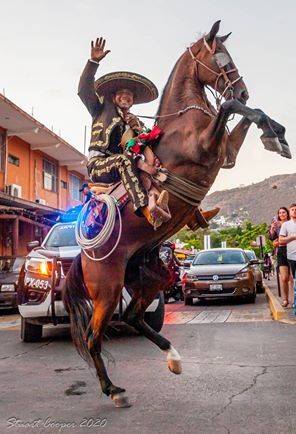
Today is a day of hope.
There is a guitar just outside our door in the hallway. Sometime soon we'll be brave enough to touch it and disinfect it. Nobody risked anything to put it there. The upstairs people had it all along. I hope I'll be able to play it. But that is mostly what the guitar is for me: a symbol of hope more than really an instrument to make beautiful music with my great talents.
And today I bought some cheese. Oaxaca cheese. I bought it from Bernardo the Cheese Man of Zihuatanejo. He, for me, symbolizes all the good of Zihautanejo. He has a beautiful smile and he coils up long strings of cheese and sells them to 3 out of 4 tables in any of the restaurants he visits on Playa Ropa. Everyone wants his cheese. When his five gallon cheese pail is empty, the women line up to dance with him. And believe it or not, he is also a full blown Caballero with a horse.
And when all the people left Zihuatanejo and the restaurants closed down, there was nobody left to buy Bernardo's cheese. And that is sad for Bernardo and all the people of Zihua and the other towns who make their living in tourism. And sad for me. I asked somebody to post a picture of him so I could remember his happy face. One thing lead to another and Eli Brady found a way to buy a few kilos, leverage up matching donations and get Bernardo's cheese safely into the hands of people who need it through the Zihuatanejo food bank.
It's a difficult time everywhere in the world. Our own friends and families and food banks in our own towns no doubt have greater needs than any of us can fulfill right now. But it also seems so important to reach out and help our friends in faraway places even if it is only a few symbolic kilos of fine Oaxaca. People of the world need to know that we are all in this together and those feelings of fear and desperation will diminish.
I pick cheese on the beach over soldiers on the border.
And I had a call today from a couple of my favourite engineering students. They've been looking for open source projects to contribute engineering design talent or manufacturing capability to provide critically needed medical equipment to hospitals in need. Turns out there is a huge gap in knowledge on real time demand and medical vetting of open source ideas that companies want to manufacture against. So Foster and Noah are putting together a project platform brief and want to get this idea in the hands of a benevolent CEO very fast. So if you know Jeff or Elon or perhaps Bill, get back to me. This needs to happen fast. My boy gives me hope.
And the most interesting tale of hope for me today comes from our friend Donna down in Zihuatanejo. She has a loaner copy of I'll Shave My Head Too and tells me she is really enjoying it and hasn't skipped ahead so she's very hopeful. I've heard other people say as they read the book how hopeful they are. What the hell?
And that is the triumph of the human mind that allows us that hope. That makes me even more hopeful.
Send cheese.
(Photo credit: Stolen from Stuart Cooper in low res - forgive me Stuart there's a global pandemic)
There is a guitar just outside our door in the hallway. Sometime soon we'll be brave enough to touch it and disinfect it. Nobody risked anything to put it there. The upstairs people had it all along. I hope I'll be able to play it. But that is mostly what the guitar is for me: a symbol of hope more than really an instrument to make beautiful music with my great talents.
And today I bought some cheese. Oaxaca cheese. I bought it from Bernardo the Cheese Man of Zihuatanejo. He, for me, symbolizes all the good of Zihautanejo. He has a beautiful smile and he coils up long strings of cheese and sells them to 3 out of 4 tables in any of the restaurants he visits on Playa Ropa. Everyone wants his cheese. When his five gallon cheese pail is empty, the women line up to dance with him. And believe it or not, he is also a full blown Caballero with a horse.
And when all the people left Zihuatanejo and the restaurants closed down, there was nobody left to buy Bernardo's cheese. And that is sad for Bernardo and all the people of Zihua and the other towns who make their living in tourism. And sad for me. I asked somebody to post a picture of him so I could remember his happy face. One thing lead to another and Eli Brady found a way to buy a few kilos, leverage up matching donations and get Bernardo's cheese safely into the hands of people who need it through the Zihuatanejo food bank.
It's a difficult time everywhere in the world. Our own friends and families and food banks in our own towns no doubt have greater needs than any of us can fulfill right now. But it also seems so important to reach out and help our friends in faraway places even if it is only a few symbolic kilos of fine Oaxaca. People of the world need to know that we are all in this together and those feelings of fear and desperation will diminish.
I pick cheese on the beach over soldiers on the border.
And I had a call today from a couple of my favourite engineering students. They've been looking for open source projects to contribute engineering design talent or manufacturing capability to provide critically needed medical equipment to hospitals in need. Turns out there is a huge gap in knowledge on real time demand and medical vetting of open source ideas that companies want to manufacture against. So Foster and Noah are putting together a project platform brief and want to get this idea in the hands of a benevolent CEO very fast. So if you know Jeff or Elon or perhaps Bill, get back to me. This needs to happen fast. My boy gives me hope.
And the most interesting tale of hope for me today comes from our friend Donna down in Zihuatanejo. She has a loaner copy of I'll Shave My Head Too and tells me she is really enjoying it and hasn't skipped ahead so she's very hopeful. I've heard other people say as they read the book how hopeful they are. What the hell?
And that is the triumph of the human mind that allows us that hope. That makes me even more hopeful.
Send cheese.
(Photo credit: Stolen from Stuart Cooper in low res - forgive me Stuart there's a global pandemic)
A Thousand Bad Decisions
26 March 2020 | Port Coquitlam
Steve Dolling
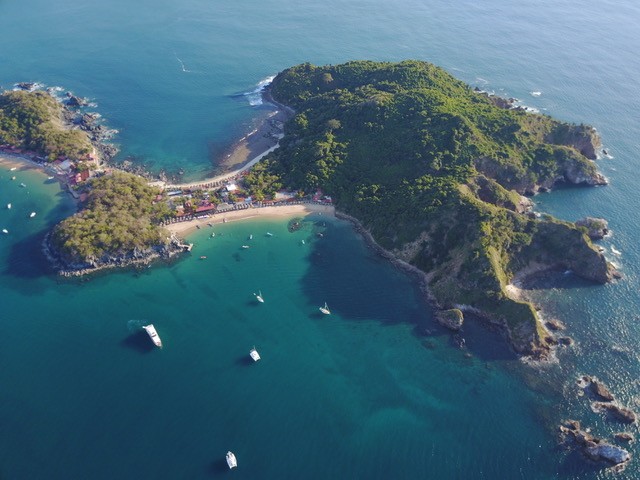
I mentioned while we were packing up the boat that we were about to make a thousand bad decisions and that I hoped to make them as quickly as possible. This wasn't actually hyperbole. We probably did make a thousand decisions.
None of them were bad decisions in that sense that we reached the wrong conclusion based on the available data, only bad in the sense that we would likely have chosen the other option when given the chance to look back retrospectively once all the unknowns become known.
I know there were some dirt dwelling folks who didn't really understand what I was talking about. Anybody who has packed up a boat to lay it up in the tropics for months has an idea.
Some of these decisions were really big ones. Should we stay on our boat here in Mexico, or should we go home? Big decisions like that have a bunch of different dimensions. What is the status of our travel medical insurance? How likely is it to do any good if we actually get sick? How likely are we to get sick? In which country? What happens if we only make it part way and get stuck in the United States? Mexico is perhaps a couple of weeks behind Canada and the US, what will it be like here a month from now? Where can we put the boat? Will it be insured? Who will look after it? Is going back the right thing to do? Are we a burden or a help to those in our host country? All of these variables were given consideration as we motored north from Zihuatanejo.
By the time we reached Puerto Vallarta, we had already made the big decision. We were going home. But we still had more decisions to make. Can we get into a marina in Banderas Bay? Which one do we choose? Do we give up the spot in La Cruz marina that was relatively unprotected for the promise of the spot in Paradise Village which is supposed to be vacated tomorrow by a boat headed for the South Pacific? Do we even ask the marina operator if we can keep the boat there all summer or just get the boat in the spot and ask questions later? Should we just drop Ken and Cheryl off at Sedna and press on to Mazatlan against a building north wind? Should we fly back? Should we drive back?
Those issues resolved and we got busy with the 1000 bad decisions. Do we remove the mainsail or wrap it and lash it? Unbolt the solar panels and stow them below? Leave the thru hulls on the engines open allowing them to easily start the engines? Wash the jib before we stow it? How do we get rid of the food? Who do we hire to look after the boat? Stow the outboard or leave it on the dingy hanging on the davits? Pickle the water maker or hope for the best? Cockroach bait deployed? What do we pack? What do we leave? Should we organize with triage bags so we can shed non-critical ones if we need to rapidly shift transport modes? Where do we rent a car? Can they deliver to the marina so we don't need to go the airport?
All of these decisions, and there were hundreds of them, were processed and acted upon in rapid succession. Normally it takes a week or more to do a good job putting the boat away and the decisions about where it is stored and how to get home are made well in advance. We did it in a day. Obviously not a good job, but it got done.
And you know what? We could have screwed up. Potentially in very big ways. If we get sick here in our quarantine, it was probably really unfortunate that we went anywhere near a Nevada hotel. But if we didn't stay in a Nevada hotel we might have ended up like the folks from Saskatchewan whose rig was a smouldering ruin north of Mazatlan as they raced to beat a border closure.
We already know that all the shortcut decisions taken were unnecessary. We had time to wash the sails. We could have done a deep cleaning. Could have put the splices in the new dock lines. We could have done a lot more. But once we were underway we learned that the US/Mexico border was being closed to non-essential traffic, so we were happy with our choices at the time. It turns out that Canadians going home is essential. Who knew?
But really, this is not a time for regrets. All kinds of people in all kinds of positions are faced with making choices now with poor data and huge uncertainty. For thoughtful people, going to Safeway to buy vegetables involves a careful calculation of the risks vs. rewards. Buying groceries is literally a life and death decision right now.
The point of all this is to give ourselves a break. There are really no bad decisions. There will be some bad outcomes. It is not the time to second guess our choices. It is our next choice that matters. And it is definitely not a time to be judging others for their decisions. (Unless of course they are out wandering around with symptoms or violating their quarantine. Have no mercy for those folks.)
Anyway, I am going to go and have a look at my retirement portfolio and my toilet paper inventory and make some bad decisions.
None of them were bad decisions in that sense that we reached the wrong conclusion based on the available data, only bad in the sense that we would likely have chosen the other option when given the chance to look back retrospectively once all the unknowns become known.
I know there were some dirt dwelling folks who didn't really understand what I was talking about. Anybody who has packed up a boat to lay it up in the tropics for months has an idea.
Some of these decisions were really big ones. Should we stay on our boat here in Mexico, or should we go home? Big decisions like that have a bunch of different dimensions. What is the status of our travel medical insurance? How likely is it to do any good if we actually get sick? How likely are we to get sick? In which country? What happens if we only make it part way and get stuck in the United States? Mexico is perhaps a couple of weeks behind Canada and the US, what will it be like here a month from now? Where can we put the boat? Will it be insured? Who will look after it? Is going back the right thing to do? Are we a burden or a help to those in our host country? All of these variables were given consideration as we motored north from Zihuatanejo.
By the time we reached Puerto Vallarta, we had already made the big decision. We were going home. But we still had more decisions to make. Can we get into a marina in Banderas Bay? Which one do we choose? Do we give up the spot in La Cruz marina that was relatively unprotected for the promise of the spot in Paradise Village which is supposed to be vacated tomorrow by a boat headed for the South Pacific? Do we even ask the marina operator if we can keep the boat there all summer or just get the boat in the spot and ask questions later? Should we just drop Ken and Cheryl off at Sedna and press on to Mazatlan against a building north wind? Should we fly back? Should we drive back?
Those issues resolved and we got busy with the 1000 bad decisions. Do we remove the mainsail or wrap it and lash it? Unbolt the solar panels and stow them below? Leave the thru hulls on the engines open allowing them to easily start the engines? Wash the jib before we stow it? How do we get rid of the food? Who do we hire to look after the boat? Stow the outboard or leave it on the dingy hanging on the davits? Pickle the water maker or hope for the best? Cockroach bait deployed? What do we pack? What do we leave? Should we organize with triage bags so we can shed non-critical ones if we need to rapidly shift transport modes? Where do we rent a car? Can they deliver to the marina so we don't need to go the airport?
All of these decisions, and there were hundreds of them, were processed and acted upon in rapid succession. Normally it takes a week or more to do a good job putting the boat away and the decisions about where it is stored and how to get home are made well in advance. We did it in a day. Obviously not a good job, but it got done.
And you know what? We could have screwed up. Potentially in very big ways. If we get sick here in our quarantine, it was probably really unfortunate that we went anywhere near a Nevada hotel. But if we didn't stay in a Nevada hotel we might have ended up like the folks from Saskatchewan whose rig was a smouldering ruin north of Mazatlan as they raced to beat a border closure.
We already know that all the shortcut decisions taken were unnecessary. We had time to wash the sails. We could have done a deep cleaning. Could have put the splices in the new dock lines. We could have done a lot more. But once we were underway we learned that the US/Mexico border was being closed to non-essential traffic, so we were happy with our choices at the time. It turns out that Canadians going home is essential. Who knew?
But really, this is not a time for regrets. All kinds of people in all kinds of positions are faced with making choices now with poor data and huge uncertainty. For thoughtful people, going to Safeway to buy vegetables involves a careful calculation of the risks vs. rewards. Buying groceries is literally a life and death decision right now.
The point of all this is to give ourselves a break. There are really no bad decisions. There will be some bad outcomes. It is not the time to second guess our choices. It is our next choice that matters. And it is definitely not a time to be judging others for their decisions. (Unless of course they are out wandering around with symptoms or violating their quarantine. Have no mercy for those folks.)
Anyway, I am going to go and have a look at my retirement portfolio and my toilet paper inventory and make some bad decisions.
Good Question Kirk
24 March 2020 | Undisclosed Location, Port Coquitlam BC
Steve Dolling
I am just going to write this here in a quiet corner of the internet.
On March 12 we decided it was time to move the boat north. The message from Canada was clear: “It is time to come home” So we started moving, ultimately completing a journey that involved sailing north 400 miles, decommissioning the boat, renting a car in Puerto Vallarta and driving to Hermasillo, hiring a driver to take us to our car in Puerto Penasco, driving across 2 borders to arrive at our new home in Port Coquitlam where we now live in isolation. 5608km total. 130 hours driving time. 9 days travelling. No restaurant meals.
It’s a very challenging time for people in the cruising community. Cruisers live on these glorious isolation platforms: fully self-contained and really designed for independent living for weeks or months at a time. It seems like perhaps the dream scenario when viewed from land, but it has it own challenges: access to ports, access to health care, provisioning, unknown reception by locals. Every choice is a difficult one as people try to figure out their next move.
Yesterday, I had a note from Kirk, (currently offshore somewhere between Puerto Vallarta and Mazatlan) asking: “So now that you are home are you more worried about giving the virus to your family or getting it from them??”
This is such a really excellent question.
The answer is yes.
I don’t want to give the virus to anyone. I would rather not get the virus.
I would not want Foster to get the virus. He is young and healthy with an excellent chance of survival, but we should understand exactly what that means. He is not immune to having a bad response. Survival means that if he does have a bad response and he is put on the ventilator his body is stronger and more able to fight on while his immune system deals with virus. Survival means that he is more likely to be given access to the ventilator than the 63 year old man who arrives on the ambulance next to his.
We are conflating these ideas of young healthy people surviving and mild relatively asymptomatic cases of the disease and thinking it is only old, unhealthy people who suffer.
Survival is skewed towards the young. Suffering is universal.
The virus is spread by people that don’t know they have it. So although I wouldn’t want Foster to get it, I also wouldn’t want him to spread it. So though he may be fine, his girlfriend’s grandmother may not. So let’s keep her alive. Her name is Adena and she is a wonderful person.
We didn’t take the groceries off our boat when we left the marina. We weren’t actually sure we would be able to cross into the United States so we wanted food to be there if we had to turn around and come back. So Jeff and Jules on El Gato agreed to take our groceries once we crossed the border. I am particularly pleased about this because Jules is on like her 5th round of chemotherapy preparing for a mastectomy. Her immune system is like 3 white blood cells right now. The fewer trips Jeff has to make to get groceries, the better. So please stay on your boat. Don’t go out. Don’t kill Jules. She needs to be alive to beat her cancer.
The virus is also spread by people that know they have it. 2 days ago in Coquitlam, there was a 65 year old asthmatic women with Covid19 seen at the grocery store and in Starbucks. She has the virus and she is happy to kill other people. And make no mistake, that is exactly what she is doing. Though I am sure she has some elaborate justification in her own mind why it makes sense for her to be out of her house. I am sure she doesn’t think of herself as a murderer, but she is trying to be. Please. Let’s educate people, shame them if we have to, but for God sakes stop the willful killing.
And don’t assume it’s safe out there.
Our public health officials are working hard to try and create a set of rules for us to live by that will stop the spread of the disease and keep us safe. For us, that means we are required to self isolate for 14 days. For the general population, that means they are advised to stay home and go out only for essentials.
We humans are incredibly smart, creative, social, people. So we may be respectful of what the government is trying to do. But we all interpret the guidelines and try to apply them to our situation and make the best of it. So if groceries are essential, doesn’t it make sense to head out each day and check out 2 or 3 stores and see who has toilet paper, hand sanitizer, or a decent meat selection? You’re not violating any rules.
Here’s an idea. No. That lady with the Covid19 is trying to kill you. Or your girlfriend’s grandmother.
I am sitting here in isolation and I think it would be really great to have maybe some pasta, or rice, or beans, or eggs, or a steak, or canned food or a guitar. But we have some turkey and vegetables, milk, tea, breakfast cereal, cheese, nuts, and coffee. We are fine. So although I could probably start ordering stuff from Amazon or the groceries from Save-On, should I? Should I reach out to friends who might have a spare guitar? No. There is no need. We’ll get more food when we need it and our friends are already going out to make a trip to the grocery store out of necessity.
If we all just sit tight for a month, this whole thing will be over. Every little opportunity we have to interact with one another, or move around, move things around, or order something on line that makes others have to move around, is a problem right now. Let it rest. In a couple of weeks we will all figure out what is the best way to get the economy going again. In the meantime if we just stop, we’re going to be OK.
So Kirk, the answer it yes.
On March 12 we decided it was time to move the boat north. The message from Canada was clear: “It is time to come home” So we started moving, ultimately completing a journey that involved sailing north 400 miles, decommissioning the boat, renting a car in Puerto Vallarta and driving to Hermasillo, hiring a driver to take us to our car in Puerto Penasco, driving across 2 borders to arrive at our new home in Port Coquitlam where we now live in isolation. 5608km total. 130 hours driving time. 9 days travelling. No restaurant meals.
It’s a very challenging time for people in the cruising community. Cruisers live on these glorious isolation platforms: fully self-contained and really designed for independent living for weeks or months at a time. It seems like perhaps the dream scenario when viewed from land, but it has it own challenges: access to ports, access to health care, provisioning, unknown reception by locals. Every choice is a difficult one as people try to figure out their next move.
Yesterday, I had a note from Kirk, (currently offshore somewhere between Puerto Vallarta and Mazatlan) asking: “So now that you are home are you more worried about giving the virus to your family or getting it from them??”
This is such a really excellent question.
The answer is yes.
I don’t want to give the virus to anyone. I would rather not get the virus.
I would not want Foster to get the virus. He is young and healthy with an excellent chance of survival, but we should understand exactly what that means. He is not immune to having a bad response. Survival means that if he does have a bad response and he is put on the ventilator his body is stronger and more able to fight on while his immune system deals with virus. Survival means that he is more likely to be given access to the ventilator than the 63 year old man who arrives on the ambulance next to his.
We are conflating these ideas of young healthy people surviving and mild relatively asymptomatic cases of the disease and thinking it is only old, unhealthy people who suffer.
Survival is skewed towards the young. Suffering is universal.
The virus is spread by people that don’t know they have it. So although I wouldn’t want Foster to get it, I also wouldn’t want him to spread it. So though he may be fine, his girlfriend’s grandmother may not. So let’s keep her alive. Her name is Adena and she is a wonderful person.
We didn’t take the groceries off our boat when we left the marina. We weren’t actually sure we would be able to cross into the United States so we wanted food to be there if we had to turn around and come back. So Jeff and Jules on El Gato agreed to take our groceries once we crossed the border. I am particularly pleased about this because Jules is on like her 5th round of chemotherapy preparing for a mastectomy. Her immune system is like 3 white blood cells right now. The fewer trips Jeff has to make to get groceries, the better. So please stay on your boat. Don’t go out. Don’t kill Jules. She needs to be alive to beat her cancer.
The virus is also spread by people that know they have it. 2 days ago in Coquitlam, there was a 65 year old asthmatic women with Covid19 seen at the grocery store and in Starbucks. She has the virus and she is happy to kill other people. And make no mistake, that is exactly what she is doing. Though I am sure she has some elaborate justification in her own mind why it makes sense for her to be out of her house. I am sure she doesn’t think of herself as a murderer, but she is trying to be. Please. Let’s educate people, shame them if we have to, but for God sakes stop the willful killing.
And don’t assume it’s safe out there.
Our public health officials are working hard to try and create a set of rules for us to live by that will stop the spread of the disease and keep us safe. For us, that means we are required to self isolate for 14 days. For the general population, that means they are advised to stay home and go out only for essentials.
We humans are incredibly smart, creative, social, people. So we may be respectful of what the government is trying to do. But we all interpret the guidelines and try to apply them to our situation and make the best of it. So if groceries are essential, doesn’t it make sense to head out each day and check out 2 or 3 stores and see who has toilet paper, hand sanitizer, or a decent meat selection? You’re not violating any rules.
Here’s an idea. No. That lady with the Covid19 is trying to kill you. Or your girlfriend’s grandmother.
I am sitting here in isolation and I think it would be really great to have maybe some pasta, or rice, or beans, or eggs, or a steak, or canned food or a guitar. But we have some turkey and vegetables, milk, tea, breakfast cereal, cheese, nuts, and coffee. We are fine. So although I could probably start ordering stuff from Amazon or the groceries from Save-On, should I? Should I reach out to friends who might have a spare guitar? No. There is no need. We’ll get more food when we need it and our friends are already going out to make a trip to the grocery store out of necessity.
If we all just sit tight for a month, this whole thing will be over. Every little opportunity we have to interact with one another, or move around, move things around, or order something on line that makes others have to move around, is a problem right now. Let it rest. In a couple of weeks we will all figure out what is the best way to get the economy going again. In the meantime if we just stop, we’re going to be OK.
So Kirk, the answer it yes.
Saline Añejo
04 March 2020 | Zihuatanejo
Steve Dolling | Clear
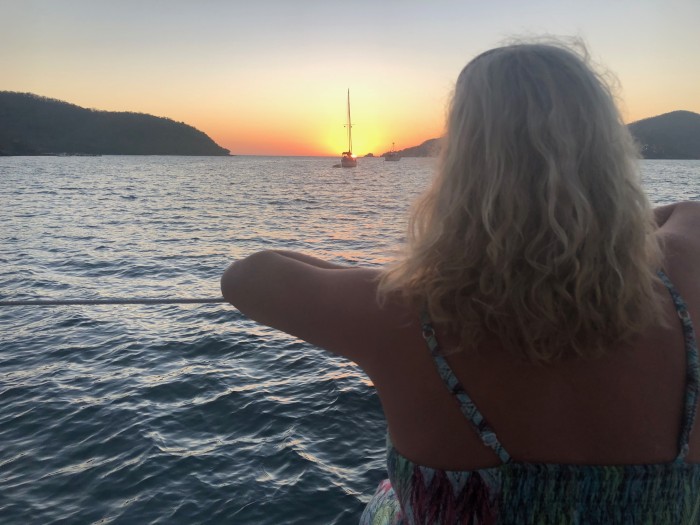
I dove into the water near sunset. It was beautifully clear. The perfect warm temperature. Some sort of silky smooth saline añejo. Absolutely refreshing without being bracing. Perfect.
We are sitting in our catamaran looking at the lights twinkle across the bay in Zihuantanejo. There are no bugs. I am lounging in t-shirt and a pair of work underwear. The temperature is maybe 23 degrees or something wonderfully comfortable. The satellite radio is on one of those chill stations, and somehow, it's not cutting out like it normally does as we hang here on the southern fringe of the transmission footprint. A gentle swell lifts the boat up about four feet and drops it down on 13 second intervals.
The sun shines every day. The solar panels top up our batteries and we have enough energy left over to run the desalinator, do a load of two of laundry, and heat water for a warm afternoon shower.
We had a call on VHF Ch. 22 from Ishmael, the local concierge on the main dock downtown. A package has arrived. Amazon Mexico has delivered my new swimsuit to replace the old one that crumbled last week.
Tracey works on gorgeous watercolours of jellyfish ready to declare that she may have achieved boredom: our sacred but unattainable cruising goal.
I took one of those sunset pictures, the kind we take just to post on social media and mess with people back home who might be freezing their asses off.
I have imaginary hardships. Cutting new mesh fabric for the trampolines and realizing I don't have a ½" punch and a die set to hammer in the #4 spur grommets. The half day of my life forever lost to disassembly and rebuild of the sewing machine motor so the stiches can keep flowing. Pulling out the guitar and trying to play "Here Comes the Sun", but the notes are not flowing. Not only am I rusty, but my guitar strings are literally rusty. There is oil to change. Not just one, but two engines.
I place an order with Amazon for new guitar strings. Ishmael will have them delivered to our boat in a couple of days. Tracey's challenge of what to get me for my birthday is solved.
We really have nothing to bitch about.
We snorkelled off the back of the boat and saw hundreds of fish and hung out with a giant sea turtle for a good long while this afternoon. The next watercolour subject is identified.
If we were looking for paradise, it might be something like this.
If we were looking.
But we're not.
Paradise is following us around. We know it. We are extremely fortunate.
But it is not like we won the lottery. We sacrificed to get here. We saved. We gave up our security, our jobs, our house, our cars, our toys. We made choices. Not all of them easy.
This is not the easy path. Sometimes it is even a bit scary. But oh my is it worth it.
And the more we gave up, the freer we became.
We leave the planet with nothing. No point in gathering up a big pile that we can't take with us. Running out of money is a problem. Running out of time is the end of all problems.
Are you in paradise yet? Why not? Maybe you're already there but don't recognize It. Paradise could be following you around. Maybe there are some choices to make. Find your turtle. Amazon can deliver guitar strings there.
We are sitting in our catamaran looking at the lights twinkle across the bay in Zihuantanejo. There are no bugs. I am lounging in t-shirt and a pair of work underwear. The temperature is maybe 23 degrees or something wonderfully comfortable. The satellite radio is on one of those chill stations, and somehow, it's not cutting out like it normally does as we hang here on the southern fringe of the transmission footprint. A gentle swell lifts the boat up about four feet and drops it down on 13 second intervals.
The sun shines every day. The solar panels top up our batteries and we have enough energy left over to run the desalinator, do a load of two of laundry, and heat water for a warm afternoon shower.
We had a call on VHF Ch. 22 from Ishmael, the local concierge on the main dock downtown. A package has arrived. Amazon Mexico has delivered my new swimsuit to replace the old one that crumbled last week.
Tracey works on gorgeous watercolours of jellyfish ready to declare that she may have achieved boredom: our sacred but unattainable cruising goal.
I took one of those sunset pictures, the kind we take just to post on social media and mess with people back home who might be freezing their asses off.
I have imaginary hardships. Cutting new mesh fabric for the trampolines and realizing I don't have a ½" punch and a die set to hammer in the #4 spur grommets. The half day of my life forever lost to disassembly and rebuild of the sewing machine motor so the stiches can keep flowing. Pulling out the guitar and trying to play "Here Comes the Sun", but the notes are not flowing. Not only am I rusty, but my guitar strings are literally rusty. There is oil to change. Not just one, but two engines.
I place an order with Amazon for new guitar strings. Ishmael will have them delivered to our boat in a couple of days. Tracey's challenge of what to get me for my birthday is solved.
We really have nothing to bitch about.
We snorkelled off the back of the boat and saw hundreds of fish and hung out with a giant sea turtle for a good long while this afternoon. The next watercolour subject is identified.
If we were looking for paradise, it might be something like this.
If we were looking.
But we're not.
Paradise is following us around. We know it. We are extremely fortunate.
But it is not like we won the lottery. We sacrificed to get here. We saved. We gave up our security, our jobs, our house, our cars, our toys. We made choices. Not all of them easy.
This is not the easy path. Sometimes it is even a bit scary. But oh my is it worth it.
And the more we gave up, the freer we became.
We leave the planet with nothing. No point in gathering up a big pile that we can't take with us. Running out of money is a problem. Running out of time is the end of all problems.
Are you in paradise yet? Why not? Maybe you're already there but don't recognize It. Paradise could be following you around. Maybe there are some choices to make. Find your turtle. Amazon can deliver guitar strings there.
| Vessel Name: | Salish Dragon |
| Vessel Make/Model: | Manta 40 |
| Hailing Port: | Vancouver |
| Crew: | Steve, Tracey, & Sometimes Foster |
| About: | Steve and Tracey have sailed out of Vancouver and are heading south until they can turn off the diesel heater. One day, they might come back. |
Salish Dragon's Photos - Main
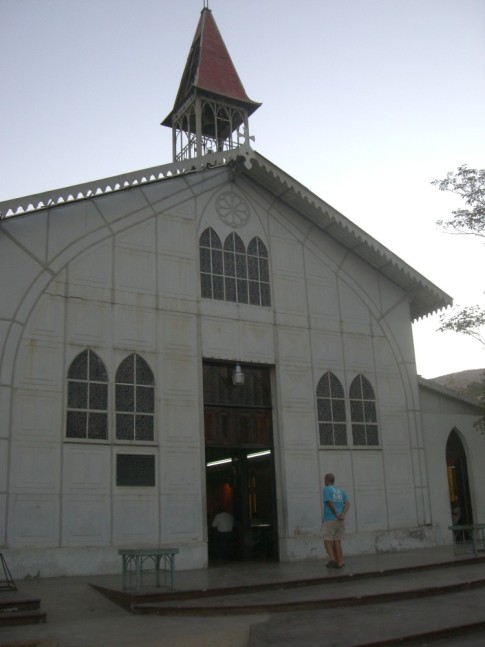 |
Exploring the Historic Copper Mining Town. The mine was purchased by the French and the town architecture has a distinct french influence.
34 Photos
Created 14 June 2010
|
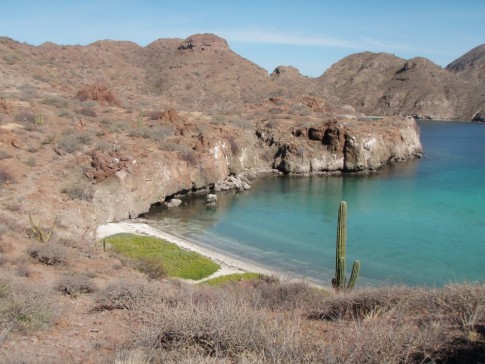 |
Beach party in San Jaunico, La Launcha on Isla Carmen, Honeymoon Cove on Isla Dazante, New bottom paint in Escondido, Bahia Coyote in Bahia Concepcion
47 Photos | 1 Sub-Album
Created 12 June 2010
|
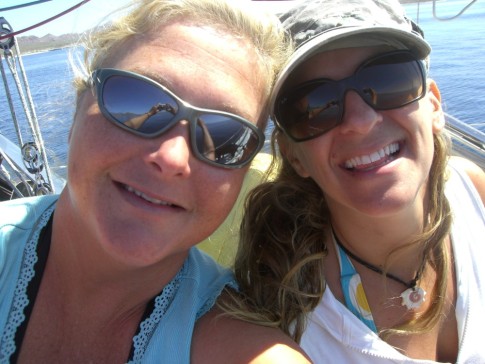 |
Saun Juanico, Isla Carmen, Isla Coranado, downtown Loreto, visits with Sarah from Puerto Moreles, re-united with sv Gato Go
107 Photos | 1 Sub-Album
Created 23 May 2010
|
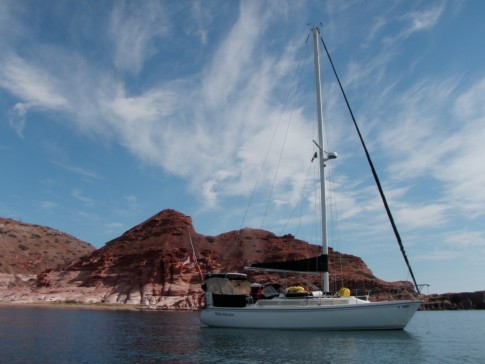 |
Met up with sv Evergreen, Josh, Carol and Dennis. Visited: Bonanza, Los Islotes, East Bay of San Francisco, Isla San Jose' and Evaristo.
88 Photos
Created 5 May 2010
|
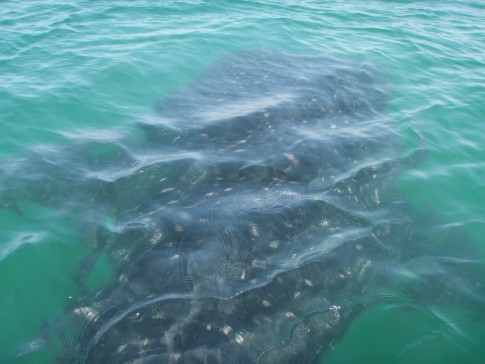 |
A few weeks dockside to work on some projects before heading north into the Sea of Cortez.
61 Photos
Created 18 April 2010
|
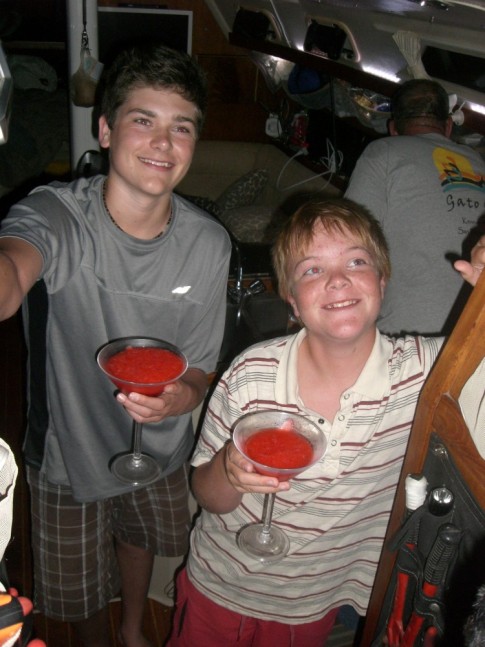 |
The Dulaba's are aboard in La Paz at Marina Palmira and we explore some of the pristine anchorages on Isla Espiritu and Isla San Francisco
43 Photos
Created 6 April 2010
|
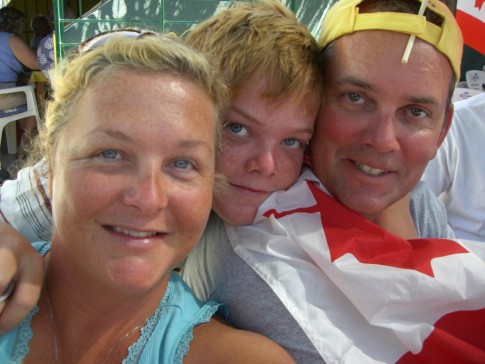 |
Making our way north. The Hillels on board until Feb 23. Tsunumi level one alert on Sat Feb 27th.
110 Photos
Created 17 March 2010
|
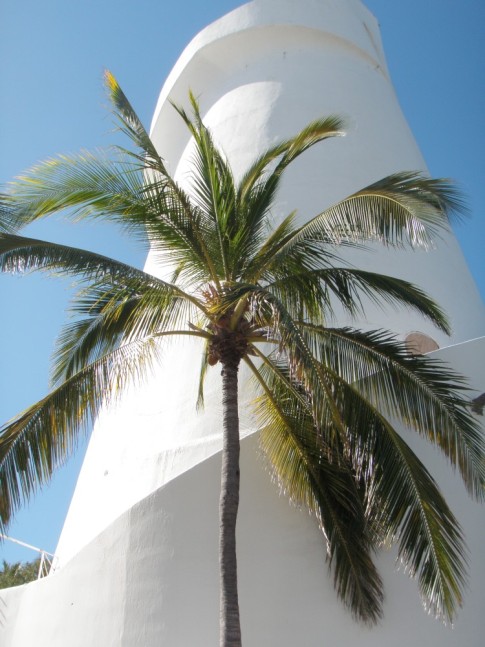 |
Travelling from Z Town to Manzanillo. Meeting with Al Sue and Hadley in Las Hadas Feb 13 for a week cruise with them.
25 Photos
Created 17 March 2010
|
The Crew
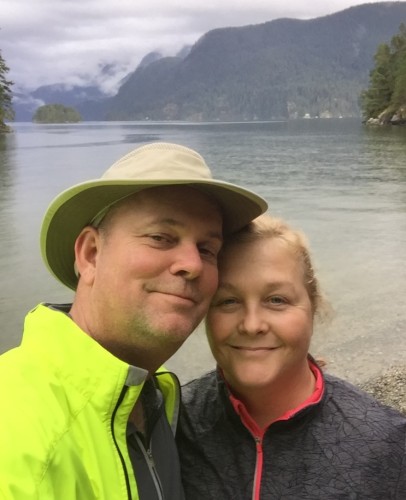
Who: Steve, Tracey, & Sometimes Foster
Port: Vancouver


